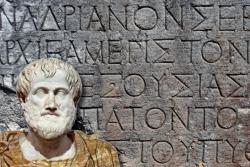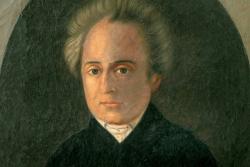Greek Language Day
 9th February has been officially declared as International Greek Language Day and is a day for Greeks, Philhellenes and non-Greeks to celebrate the important role the Greek language has played in world culture. Greek language and culture has spread across more than 35 Centuries, providing an unbroken link between modern-day Greeks and their ancient ancestors. Unlike Latin, Greek is a living language currently spoken by more than 11 million people throughout Greece and by several million spread across the world. Greek and Chinese are the only languages spoken today whose origin was known more than 3,500 years ago. Today, the Greek language is not only alive within Greece, but has a second life, its alphabet, vocabulary, syntax and literature are present in all languages around the globe.
9th February has been officially declared as International Greek Language Day and is a day for Greeks, Philhellenes and non-Greeks to celebrate the important role the Greek language has played in world culture. Greek language and culture has spread across more than 35 Centuries, providing an unbroken link between modern-day Greeks and their ancient ancestors. Unlike Latin, Greek is a living language currently spoken by more than 11 million people throughout Greece and by several million spread across the world. Greek and Chinese are the only languages spoken today whose origin was known more than 3,500 years ago. Today, the Greek language is not only alive within Greece, but has a second life, its alphabet, vocabulary, syntax and literature are present in all languages around the globe.
You speak Greek, you just don't know it . . . as more than six thousand Greek words are spoken in the English language alone.
 9th February has been selected as the day to celebrate the Greek language because it coincides with the Commemoration Day of Greece's 'national poet' Dionysios Solomos. Born in Zakynthos on 8th April 1798, Solomos is considered the national poet of Greece, not only because he wrote the national anthem, but also because he contributed to the preservation of earlier poetic tradition and highlighted its usefulness to modern literature. The famous Greek work of Solomos was the 'Hymn to Liberty', completed in May 1823, a poem inspired by the Greek Revolution of 1821. The National Anthems of Greece and Cyprus consists of the first two verses of the poem, the anthem along with its music, was printed for the first time in London in 1873. Dionysios Solomos died on 9th February 1857.
9th February has been selected as the day to celebrate the Greek language because it coincides with the Commemoration Day of Greece's 'national poet' Dionysios Solomos. Born in Zakynthos on 8th April 1798, Solomos is considered the national poet of Greece, not only because he wrote the national anthem, but also because he contributed to the preservation of earlier poetic tradition and highlighted its usefulness to modern literature. The famous Greek work of Solomos was the 'Hymn to Liberty', completed in May 1823, a poem inspired by the Greek Revolution of 1821. The National Anthems of Greece and Cyprus consists of the first two verses of the poem, the anthem along with its music, was printed for the first time in London in 1873. Dionysios Solomos died on 9th February 1857.
The international airport on the Greek island of Zakynthos and a square in Nicosia, Cyprus, are named after Dionysios Solomos.